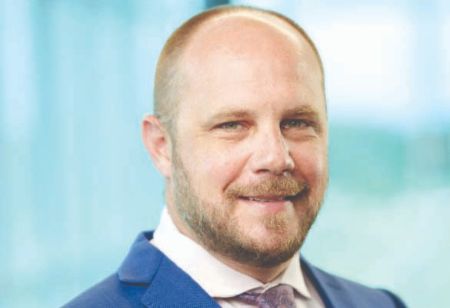Thank you for Subscribing to Healthcare Business Review Weekly Brief

Brooks Rehabilitation Burned Out Staff
Healthcare Business Review
What is your overview about the current trends in the market?
Drug diversion is one of the major issues currently affecting the U.S. healthcare sector, with hospitals and rehab centers trying to curb substance abuse instances within their workforces. While larger centers are already implementing new technologies to track the utilization of controlled substances during treatment, smaller centers with a limited budget are struggling to incorporate technologies that can monitor their staff. At Brooks Rehabilitation, we are developing a system to perform meticulous lifetime audits, using data analytics to determine early pulls, late administrations, and medical wastes. The system will especially monitor nurses with high risks, providing relevant leaders with the data required to facilitate better decision-making around pulling back medications and placing constraints around specific medications.
Antibiotic stewardship is also fast gaining traction alongside this in the U.S., especially with the rising resistance of pathogens to conventional antibiotics. As a result, many of the ailments are becoming harder to treat across acute care and rebab care settings. Brook Rehabilitation has created a specialized team for antibiotic stewardship, which will ensure that the most effective antibiotics are prescribed to the patients. The team’s role includes augmenting the accuracy of different tests, including urine analysis, and ensuring that proper procedure is followed by the practitioners.
What according to you is a major challenge hindering effective medication management?
One of the biggest challenges in the healthcare space is medication costs. Generic medicines are being made, but they are not always as good as the original drugs. As the expenses of medications continue to increase, patients are finding it more and more challenging to be able to afford the original drugs. When they come to the rehab settings, they are expensive for us to administer as well, so we are always trying to make sure that we have the best and most financially sustainable medication by combining original and generic drugs. Making sure that the patients are getting the best and most affordable drugs upon discharge continues to be one of the biggest struggles in this industry. When it comes to acute care settings, we have one formulary. The accessibility of medicines and cost-effectiveness has to be consistent for each patient. Whether it is insulin, antibiotics, or prophylactic drugs, we deliver surgeon and physician-recommended drugs that are more effective in the long run.
What is your approach to identifying the right partnerships or solution providers that can boost your innovations in the pharmaceutical industry?
We have a dedicated pharmacist Erin Miller on board who possesses vast pharmaceutical knowledge, especially when it comes to the development of effective formularies. With her at point, we are constantly evaluating and revaluating, and continuing to reach out to the buying power of the larger companies in the US.
The scenario is quite different for larger corporations, as brand names can often bring down the costs of medications. For instance, pharmaceutical companies are more willing to negotiate the drug price with entities that have over 100 hospitals across the nation.
In this regard, Brook Rehabilitation has associated with a health care association (HCA), which will impart us with the buying power of larger hospital chains. They work well with us, and they see the value in the services we provide to all patients. So, they are willing to continue to partner with us and help us out with our overhead costs. This will significantly bring down our overhead costs, while also allowing us to deliver better treatment at cost-effective rates.
Based on your observations of trends, what evolutions do you foresee in the medication management market?
The ongoing pandemic has caused several supply chain issues in the medication market. We are methodically planning and executing medication orders to deal with these challenges. For instance, we are opening a new hospital next week, and our meticulous planning is ensuring that we have sufficient lead time to procure the relevant medications. Our pharmacists are working closely with HCA to streamline the procurement time for medications. They are also making sure that we have all medications in place well before opening our new hospital. Most of the suitable drugs are already loaded in our Pyxis machines – an automated medication dispensing system. We now have everything we need to provide high-quality care for our patients from the beginning.
Antibiotic stewardship is also fast gaining traction alongside this in the U.S., especially with the rising resistance of pathogens to conventional antibiotics
Do you have any advice for professionals seeking to embark on a similar journey along the lines of your experience and background?
The right partnership can work wonders in the medication management space for both acute care and rehab care settings. Acute care settings, different from rehab settings, are usually expanding, and they have significant experience in opening new centers and buying out other hospitals. Rehab settings can match the efficiency of acute settings by establishing freestanding hospitals and forming partnerships with pharmaceutical firms. In this regard, our pharmacist, Erin, was able to facilitate a partnership with an expert well versed in the pharmaceutical industry. We partnered with the external vendor to ensure the completion of our sterile compounding as well as the safety inspections, while also eliminating any liabilities. The vendors also help us make sure that all our policies are in place and that we can open up on time. Some of the biggest things in finding the correct partner is doing a very diligent search for someone who fits into your culture, is detail-oriented, and is well versed in pharmaceutical ordering.
Especially during the pandemic, we took a chance and ordered all of our Pyxis medication machines well in advance to facilitate the unveiling of our new hospital. This enabled us to manage our risks efficiently and enable the safe utilization of medications.









